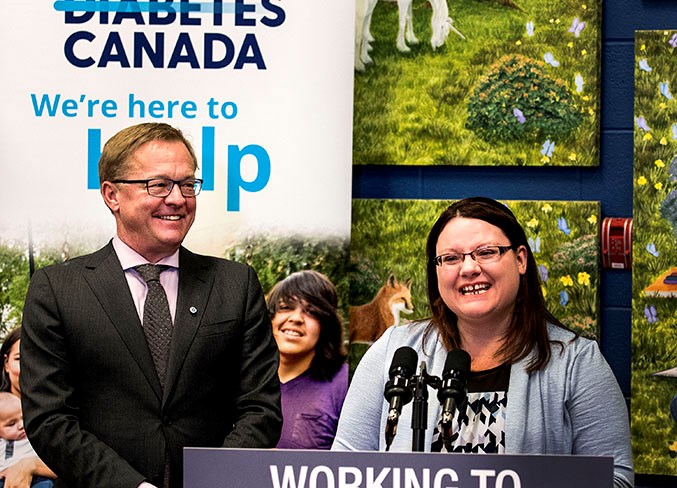After advocating for new school policies for students with Type 1 Diabetes, Deanna Emberg stood beaming next to elected officials as they announced new guidelines Tuesday morning.
“I think a lot of reluctance from school boards is that they don't understand how complex the disease is and so these guidelines demystify them,” she said afterward.
Guidelines for Supporting Students with Type 1 Diabetes defines what diabetes is, how to create individual care plans and information sheets on the disease, and outlines responsibilities that should be met by teachers and principals in supporting students with diabetes.
“It's a huge step forward in accommodating students with Type 1 Diabetes in our schools,” said Education Minister David Eggen, standing in the St. Albert Public Library for the announcement.
Emberg, whose daughter Natalie was diagnosed with diabetes when she was six years old, has been advocating for her daughter’s health over the last two years.
In March 2018, after several months of discussions with the school, Natalie was able to receive insulin and glucagon shots from a nurse contracted by the school. The nurse would also monitor her blood sugar levels.
Deanna said there was no policy at the time outlining how to support students with diabetes, which prevented the school from meeting her daughter’s needs.
Natalie was originally given slow-acting insulin shots in the morning to get her through the day. But the treatment option wasn’t working, so her pediatric endocrinologist decided to put her on a different plan.
The new treatment plan required shots throughout the day, which the school would’ve required Natalie to perform herself.
Samantha Roth, whose five-year-old son has Type 1 Diabetes, has decided to homeschool her son because school policy tends to be lacking around the disease.
“You can't imagine a school not administering an EpiPen to someone having a peanut allergy, but they won't administer glucagon to a diabetic or insulin to a diabetic,” she said.
Her son was diagnosed with the disease at 16 months old after being rushed to the emergency department in a comatose state.
Roth noticed his health kept deteriorating in the weeks before, but said doctors told her that her child was experiencing a cold.
For her, having her son at a school without any medical assistance is too much to bear. Instead, Roth has decided to stay home and watch over him.
But the two young people aren’t alone in their struggles. Scott McRae, regional director for Alberta Northwest Territories Diabetes Canada, said one in 300 students across Alberta has Type 1 Diabetes. He said the announcement was a step in the right direction.
“It's not all the way, and the minister is very aware of that and fully acknowledges that, but this is a huge step towards letting kids with Type 1 Diabetes be full and equal participants at their school,” he explained.
Some shortcomings
The government’s new guidelines leave it up to schools to form their own diabetes management policies.As a result, some parents are worried funding could get in the way of having a trained professional at the school who can administer glucagon and insulin injections.
“Principals have the ability to basically get (educational assistants) for kids depending on their budget, but it's their choice,” said Roth.
While Emberg was fortunately able to get her daughter’s school to contract a nurse after several months of discussions, not all parents are so lucky. She said she brought up school funding concerns with the minister’s office in 2017.
In response, she said she was told most schools already have it within their budgets to afford nurses and educational assistants. But Emberg said she’s not convinced.
“We'll see, you know, and that's all we can do,” she said, adding she was glad the government was taking this step forward.
In a follow-up interview, Eggen said the government could provide additional funding if schools were unable to afford contracted professionals, such educational assistants.
While many schools in Alberta already have policies for diabetes, Eggen said the guidelines would set a standard across the province.
He said the guiding document is meant to help schools form their own policies, and not control how those policies are made.
“I respect the autonomy and the ability of schools to develop programming,” he explained.




